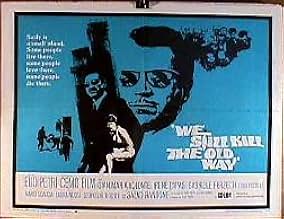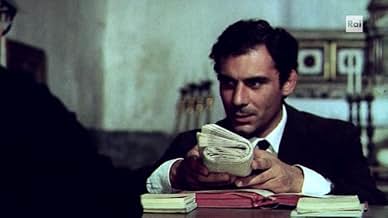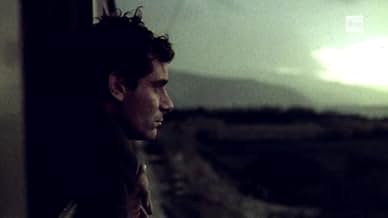IMDb RATING
7.0/10
2K
YOUR RATING
In Sicily, a leftist professor investigates the "honor killings" of two friends, uncovering a tangled web involving politicians, the Mafia, the Church, and the widow of one of the victims.In Sicily, a leftist professor investigates the "honor killings" of two friends, uncovering a tangled web involving politicians, the Mafia, the Church, and the widow of one of the victims.In Sicily, a leftist professor investigates the "honor killings" of two friends, uncovering a tangled web involving politicians, the Mafia, the Church, and the widow of one of the victims.
- Director
- Writers
- Stars
- Awards
- 6 wins & 2 nominations total
- Director
- Writers
- All cast & crew
- Production, box office & more at IMDbPro
Featured reviews
Paolo Laurana is a kind of leftist intellectual who chances to be intrigued by a mysterious double murder in the Sicily of mid Sixties. In his personal detection for murder's instigators, he will run into a plot in which both politicians and mafia racketeers are involved. So curiosity will become a very dangerous affair. Taken from a novel by Leonardo Sciascia (1921-1989), A ciascuno il suo (1967) is a film where high rank acting is at its top. Cast (Gianmaria Volonté, Irene Papas, Gabriele Ferzetti, Salvo Randone, Luigi Pistilli. Mario Scaccia, Leopoldo Trieste) is perfect and well-combined, direction (Elio Petri, 1929-1982) is powerful and impressive. If compared to the novel, Elio Petri's film (written with Ugo Pirro) may seem short of that illuministic pessimism that breathes through Sciascia's books, but Laurana's rationalistic search for truth retains that `bitter taste of intelligence' which is one of the major feature of Sciascia's characters. A key film to understand historical condition of Italy in the Sixties.
At the beginning of the movie a pharmacist receives an anonymous letter that threatens him of death. And the murder actually happens. Seems very simple but nothing is what it seems and the journey to the truth will be long and difficult. The book is excellent and the movie is at par with it and very faithful to the romance. Great direction. Incredible cast with Gabriele Ferzetti in his best interpretation together with the one in "C'era una volta il West" and Gianmaria Volonté simply beyond reach as always. Many other great actors. Yes I am an enthusiast 'cause there's not a word or a shot out of place in this movie and the plot is ingenious. Who is going to see this film for the first time will be taken away by the developments (the pace seems to be calm but looking in between the kinks you may realize that many things are going rapidly on). Trying to figure out what is the kernel of the happenings and the "reasons" for the murder is a very interesting exercise but it's highly unlikely for the spectator not to experience a big surprise at the end. In my opinion Elio Petri at his best (I mean at the same level of his other masterwork: La classe operaia va in Paradiso).
The Elio Petri film is unimpressive though it won the Best Screenplay Award at Cannes. Guess the subject and the story telling were interesting in 1967, Interesting to see Irene Papas in a negative role.
A left-wing professor stressed by moral doubts (Gian Maria Volonté) has the rather strange idea to try to break the ambiant omerta in order to clear the violent death of two friends, honor issues happening just to conceal quite more material interests. But Sicily and its little folk of mute but watchful characters don't seem ready to accept this kind of trouble. Bound with beauty but ungraspable like the doctor's few disconsolate widow (Irene Papas), the island and its stifling sun know how to subdue the one who dares to upset their immutably established order, between a conspicuous church and an invisible mafia.
Gian Marie Volonte's got himself into some hot water this time! Doesn't he know that in Sicily, if someone gets murdered, you just keep your trap shut and let whoever the police randomly arrest go to jail?
Luigi Pistilli keeps getting letters telling him he's a dead man, and its making him a bit paranoid. Nevertheless, one morning he says goodbye to his wife, then his lover, and sets off with his friend to go hunting, only to find himself the prey. Two corpses later, we've got a bit Sicilian funeral to go to while the police chat about the people attending, including a well-respected lawyer (Gabriele Ferzetti) who's cousin (Irene Papas) was married to one of the victims, and Gian Marie Volonte, a professor friend of the two who starts poking in places that should not be poked.
Pistilli is generally thought to be the target as he was a bit of a fanny rat and some family members are arrested, but they are all illiterate so how could they cobble together those threatening letters. Volonte also finds that the words in the letter were from a Vatican-based newspaper, which leads him to the priesthood. Oh, and a lot of people are related in this film, so one of the priests is the uncle of Papas and Ferzetti.
It's a formula you'll see a lot of in these films, so it's just as well the lead actors are good! Volonte has the hots for the widow Papas and has to basically restrain himself every times he meets her, while Papas kind of has the hots for him too, leading to all kinds of awkward moments. Volonte is very good at the bookish professor who is just too smart and curious for his own good, while Papas just smoulders as the widow.
It looks absolutely scorching hot in Sicily in this film, and just like Damiano Damiani's Day of the Owl, the island itself is a character, with all the strange culture that lives on its land.
The only let down of the film is that the plot is a bit predictable, but it's by no means a bad film.
Luigi Pistilli keeps getting letters telling him he's a dead man, and its making him a bit paranoid. Nevertheless, one morning he says goodbye to his wife, then his lover, and sets off with his friend to go hunting, only to find himself the prey. Two corpses later, we've got a bit Sicilian funeral to go to while the police chat about the people attending, including a well-respected lawyer (Gabriele Ferzetti) who's cousin (Irene Papas) was married to one of the victims, and Gian Marie Volonte, a professor friend of the two who starts poking in places that should not be poked.
Pistilli is generally thought to be the target as he was a bit of a fanny rat and some family members are arrested, but they are all illiterate so how could they cobble together those threatening letters. Volonte also finds that the words in the letter were from a Vatican-based newspaper, which leads him to the priesthood. Oh, and a lot of people are related in this film, so one of the priests is the uncle of Papas and Ferzetti.
It's a formula you'll see a lot of in these films, so it's just as well the lead actors are good! Volonte has the hots for the widow Papas and has to basically restrain himself every times he meets her, while Papas kind of has the hots for him too, leading to all kinds of awkward moments. Volonte is very good at the bookish professor who is just too smart and curious for his own good, while Papas just smoulders as the widow.
It looks absolutely scorching hot in Sicily in this film, and just like Damiano Damiani's Day of the Owl, the island itself is a character, with all the strange culture that lives on its land.
The only let down of the film is that the plot is a bit predictable, but it's by no means a bad film.
Did you know
- TriviaFilm debut and only film performance of Anna Rivero.
- ConnectionsEdited into Lo schermo a tre punte (1995)
- SoundtracksPour rêve l'hiver
("A Dream for Winter") (uncredited)
Lyrics by Arthur Rimbaud
Music by Luis Bacalov
Sung by Léo Ferré
- How long is We Still Kill the Old Way?Powered by Alexa
Details
- Release date
- Country of origin
- Language
- Also known as
- We Still Kill the Old Way
- Filming locations
- Production company
- See more company credits at IMDbPro
- Runtime1 hour 39 minutes
- Sound mix
- Aspect ratio
- 1.85 : 1
Contribute to this page
Suggest an edit or add missing content



























